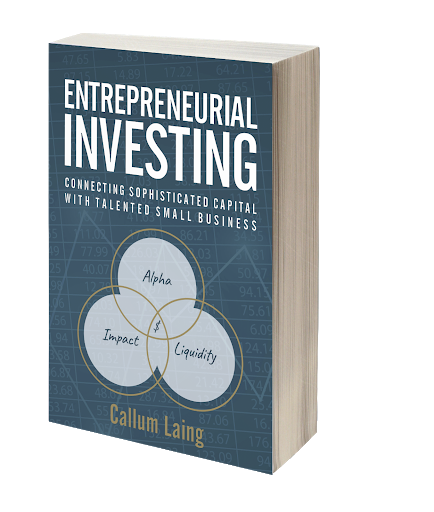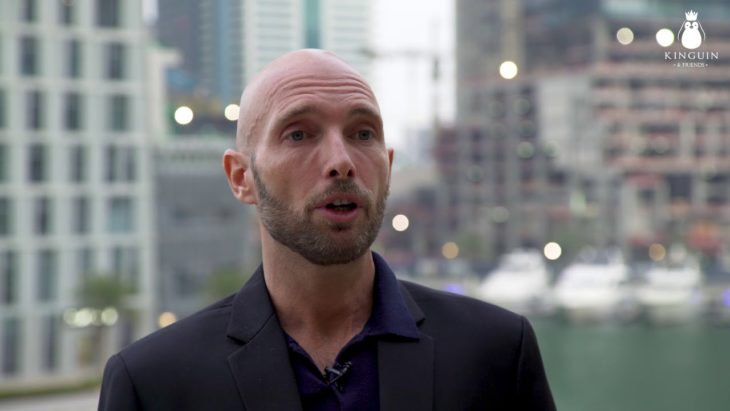The bestselling author of Progressive Partnerships and Agglomerate – Idea to IPO in 12 Months, returns with an attention-grabbing piece on investing. In a time when anyone can write a book on entrepreneurship and investing, it is a pleasure to feed from the knowledge and experience of someone who has actually done it. Several times over.
In this interview session, we welcome the business author to share his experiences in his own words. So, join us as we get started.
In a nutshell, can we get to know you? Your name and what you do?
I am Callum Laing, I’m the CEO of MBH, a very fast growing publicly listed company; a partner in a boutique mergers and acquisitions company; and an author of a couple of business books. I also help out as a High Commissioner for the World Business Angel Investment Forum and serve as an Ambassador for Deal Gateway.
I have been an entrepreneur for 20+ years and an investor for about a decade now. In the last 5 years, I have devoted a huge chunk of my time to helping companies go public using the stock market. I live in Singapore with my wife and 2 daughters and play as much sport as I can when I get the time.

(Callum Laing – CEO of MBH, Investor/Author)
Impressive. So you have a new book ready to hit the market in weeks. What’s the title of this book and what is it about?
Entrepreneurial Investing: Connecting Sophisticated Capital with Talented Small Business is my newest book. I wrote the book to explain a new model and a new way of thinking when it comes to investing in small businesses.
Right now, small businesses account for 50% of the GDP (Gross Domestic Product) of developed countries. They also get credit for 9 out of every 10 private sector employment in these countries. The businesses I talk about are not even the fast growth, high tech companies that get all the media attention. We’re looking at real businesses like construction, education, maintenance companies etc.
However, a common problem with traditional small businesses is that they are very ‘illiquid’. Put in another way, it is often very difficult to get back the money invested in these companies. An obvious economic implication of this is that The Wall Street / London City financiers – here referred to as ‘sophisticated capital’ – will not invest in these companies. As expected, growth is uncertain and harder to predict in these small businesses and companies.
Summarily, the entire financial markets are completely separated from half the world’s economy. It makes no sense and needs to be addressed. This book is about a solution we’re working on.
You titled this book “Entrepreneurial Investing: Connecting Sophisticated Capital with Talented Small Business”. In your definition as the author, what type of business would you refer to as “talented small businesses”
I used those words to refer to existing companies that have an established client base and are already profitable. As an investor, I (as well as the teams I work with) tend to focus on owner operated businesses that have demonstrated that they know how to build a profitable, debt free business. These businesses are the “talented small businesses” I wrote about.
What may have inspired you to write this book? I mean, at what point did it occur to you that you’d like to write a book?
Getting “sophisticated capital” to invest in “talented small businesses” is a task that is bigger than me and our business. There is need to get more investors onboard.. A book is still one of the best, and most scalable solutions I’ve found to help get the idea out and start to build a community of enthusiastic investors that want to profit from this opportunity.
Interesting. Now who needs this book?
Any investor, retail or institutional, that is interested in the public markets and how to exploit new opportunities will benefit from the content of this book. Most investors are seeking an edge. Something that will allow them to outperform the market. I believe this book will give them that edge.

In an era of vlogging, podcasting and more, you chose to write. Why did you go that route?
Despite all the other mediums and distractions out there, a book remains an incredibly effective tool for explaining ideas in depth. I can get people interested in the key ideas of the book through social media. However, those who really want to understand how they can make money from this shift will want to read the book and get all the details they need.
In what formats can readers access this book and where? E-book, audio book or hardcopy? Amazon, Kindle, Audible, your site?
Yes! The book will be published early in February and will be available on Amazon, Kindle, Audible etc.
What was the most challenging part about writing this book?
When what you are writing about is as important and exciting as this topic, it is tempting to want to share everything you know and everything you have learnt along the way. The challenge was to step back and drill down into what is the most important thing the reader needs to understand to maximise their returns. Summarily, it was challenging to keep things as succinct as possible without underselling the huge opportunity the book reveals.
In the course of writing a book, many writers get to understand something about themselves or the world. What was that one thing about yourself that writing revealed to you?
Writing is a brilliant tool for helping you clarify ideas in your own head. It forces you to question assumptions, and become very clear about how to articulate ideas. The course of writing this book helped crystalize in my mind just how important it is for investors and for small businesses to have a way to connect the two effectively.
Are you willing to pursue a career in writing?
No. I am an entrepreneur who loves solving problems and building businesses around those solutions so that they can scale. I use writing as a tool to help impact more people, nothing more.

Source: youtube
Did you experience writer’s block while writing? And if you did, how did you overcome it?
Not really writers block as such. However, it was initially a huge challenge structuring the book in a way that made the most sense to readers. In the end I found that by sharing what I was looking for as an investor the book flowed more naturally.
How many books have you written? And how many are published?
This is my 3rd published book. My first, ‘Progressive Partnerships’ was written for companies looking to scale up, probably those earlier in their journey. ‘Agglomerate – Idea to IPO in 12 months’ was written for the business owner with an established profitable business asking ‘what next?’. This is the first book I’ve written for the investor and it is basically how they can profit from the hard work of small business owners.
What words do you have for aspiring writers especially the ones interested in the field of business and investing?
You need to have a unique take on things. Write the book you would want to read, not necessarily the book others are writing. I am not an expert in finance or investing by any stretch and I don’t pretend to be. But then, my background of having a foot in entrepreneurship and a foot in investing hopefully gives me a unique perspective that can help an investor to profit from this area.
What do you love the most about being an author?
It’s a little bit self-indulgent but I love hearing from people that have benefited from the ideas I’ve shared and I’m lucky enough that people kindly share with me when they do, on a regular basis too. It’s a privilege to hear from them and often it leads to more business opportunities for everyone.
Do you have any plans for a book tour or campaign or outreach of any sort?
We have a lot of activities going on around the launch, mostly online as this is a very global market we now live in. I speak a lot at conferences around the world so will obviously be sharing lessons from the book as much as I can. We are planning a virtual summit for ‘Entrepreneurial Investors’ in early May that will allow investors to hear from thought leaders around the globe on the trends that they are seeing.
It has been really nice having you on this interview, Mr. Laing.
